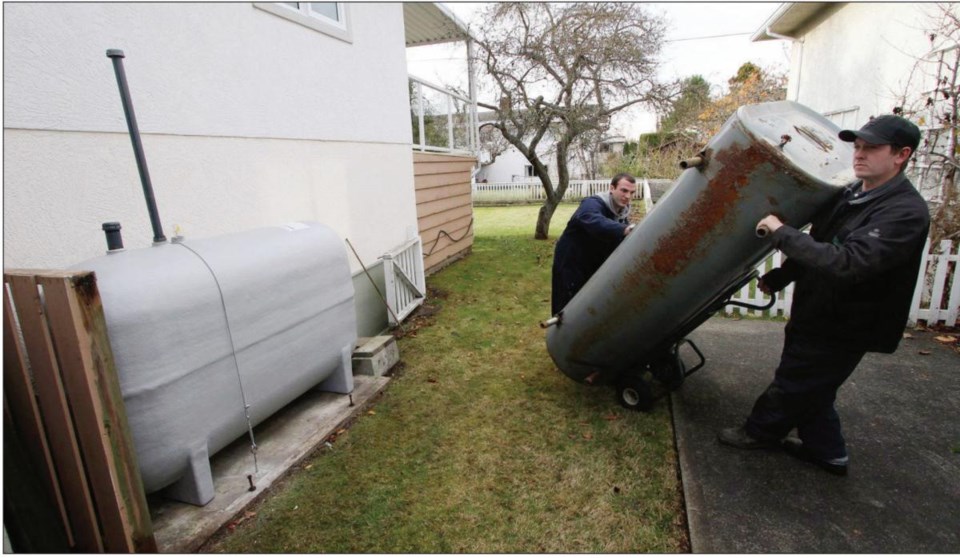Is it the end of the road for the humble oil furnace, a fixture in many Canadian homes for the past 60 years?
Some of the thousands of homeowners who still heat with oil see their aging oil tanks as ticking environmental time bombs.
The fear is understandable. Several recent high-profile spills - the latest resulting in the demolition of a Saanich house in order to properly clean the contaminated soil under it - have made homeowners question their continued use of oil as a heating fuel.
While some in the business of selling or supplying oil admit it is a sunset industry, there is still a core group of users who believe oil is a viable and economical alternative, despite its dirty reputation.
This week, Bill Carlton of Oak Bay replaced his 15year-old steel tank with a new fibreglass oil tank that has a 30-year warranty against leaks. He admits the deciding factor was reading recent news reports about oil spills.
But he's keeping his oil furnace. He says his annual fuel bill is around $1,200, making the cost of conversion to a gas furnace not economically viable.
"I'm happy with the heat," says Carlton, 80. "I toyed with the idea of changing when natural gas was made available on my street, but ultimately decided to stay with oil."
A new steel tank has an estimated 15 years of life. That's the maximum time before insurance companies insist owners replace them.
"It's prudent to get a new tank, if just for the peace of mind it brings," says Eric Hartley, president of Bill Hartley Insurance.
Most tanks have a plate that gives the year of manufacture. Any tank that is missing such a plate is likely more than 10 years old. Hartley says most home-insurance policies cover oil spills on the policyholder's property, but exclude third-party damage - to a neighbour's property, for example.
But a new generation of fibreglass and double-walled oil tanks has an answer for that - a $5-million pollution warranty that covers cleanup, even if it spills onto a neighbour's property.
These new tanks cost between $2,000 and $2,500, compared to $1,500 for a regular tank.
But worries about oil spills aside, there are still a number of people who swear by their oil furnaces.
"I have had customers who had switched to gas tell me they miss the instant warmth of an oil furnace," says Dan Murray, president of Green Generation Heating.
"Fifteen years ago, an oil furnace might have been about 65 per cent efficient.
Today, it is 80 to 84 per cent. Recently, a company introduced one that is 95 per cent efficient."
Most new oil furnaces cost between $3,000 and $3,500 to replace, less than the $4,500 for a gas furnace.
While he is the first to admit oil is a sunset business - hardly any new construction includes an oil furnace - there are areas of the city where oil is still king, because natural gas is not available.
For these homeowners, the only alternative is to switch to electricity, which is more expensive than oil. A heat pump is another option, but that costs about $10,000 to convert and install.
People who switch to electric baseboard heaters from a forced-air system without installing some sort of air-exchange system will quickly find their house plagued with poor air circulation, often resulting in humidity and mould problems.
The other consideration for cost-conscious homeowners is competition among fuel providers - or lack thereof.
While the natural gas and electricity markets are controlled by monopolies, the oil-supply market is split among one or two major firms and five or six smaller independents.
This healthy competition helps keep prices down, as companies vie to capture or retain market share.
"The market might be declining, but it is declining at a slow rate," says Eric Gault, operations manager for Peninsula Co-op, which has more than 60,000 members. "Very few, if any, new homes are being built with oil furnaces installed in them. We offer oil delivery just to meet the needs of our members, but we are able to deliver that service profitably."
Murray says that economy aside, some people are simply afraid of gas.
"At least once a year, there will be a news story about a gas explosion in a house," he says. "That's not something you will hear about with oil."
Murray suggests people with oil furnaces keep them working at peak efficiency by having them properly tuned up and ensure furniture or carpeting isn't covering cold-air returns around the house.
A homeowner considering a change should look at every angle, because there are benefits to living with oil, says Murray. "There is no a slam-dunk."



